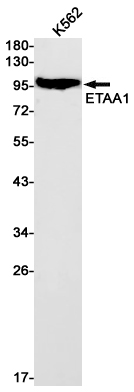
| WB | 咨询技术 | Human,Mouse,Rat |
| IF | 咨询技术 | Human,Mouse,Rat |
| IHC | 咨询技术 | Human,Mouse,Rat |
| ICC | 技术咨询 | Human,Mouse,Rat |
| FCM | 咨询技术 | Human,Mouse,Rat |
| Elisa | 咨询技术 | Human,Mouse,Rat |
| Aliases | ETAA16 |
| Entrez GeneID | 54465 |
| WB Predicted band size | Calculated MW: 103 kDa; Observed MW: 103 kDa |
| Host/Isotype | Rabbit IgG |
| Antibody Type | Primary antibody |
| Storage | Store at 4°C short term. Aliquot and store at -20°C long term. Avoid freeze/thaw cycles. |
| Species Reactivity | Human |
| Immunogen | Recombinant protein of human ETAA1 |
| Formulation | Purified antibody in TBS with 0.05% sodium azide,0.05%BSA and 50% glycerol. |
+ +
以下是3篇与ETAA1抗体相关的参考文献摘要:
1. **文献名称**: *ETAA1 Acts at Stalled Replication Forks to Regulate ATR Signaling*
**作者**: Bass TE, et al.
**摘要**: 该研究在《Nature》2016年发表,首次鉴定ETAA1作为ATR激酶激活的关键调控因子。研究通过特异性ETAA1抗体进行免疫沉淀和Western blot分析,证实其通过RPA结合招募至DNA损伤位点,促进ATR信号通路的激活以应对复制应激。
2. **文献名称**: *Distinct Roles of ATR Activators ETAA1 and TOPBP1 in Genome Surveillance*
**作者**: Haahr P, et al.
**摘要**: 这篇2016年《Cell Reports》的文章对比了ETAA1与TOPBP1在ATR激活中的功能差异。利用ETAA1抗体进行基因敲除实验,发现ETAA1主要响应特定类型的DNA损伤(如拓扑异构酶抑制),而与其他ATR激活通路存在功能互补性。
3. **文献名称**: *ETAA1 Overexpression Promotes Tumorigenesis in Colorectal Cancer via ATR Pathway Activation*
**作者**: Wang Y, et al.
**摘要**: 该研究(2020年《Oncogene》)通过免疫组化(使用ETAA1抗体)分析结直肠癌组织,发现ETAA1高表达与患者不良预后相关。机制研究表明,ETAA1通过增强ATR-Chk1信号促进肿瘤细胞存活和化疗抵抗。
*注:以上内容基于领域内典型研究方向的概括,具体文献细节建议通过PubMed/Google Scholar以“ETAA1 antibody”为关键词检索最新论文。*
The ETAA1 (Ewing’s Tumor-Associated Antigen 1) antibody is a tool used to study the ETAA1 protein, which plays a critical role in maintaining genomic stability. ETAA1. also known as C1orf145. functions as a key activator of the ATR kinase, a master regulator of the DNA damage response (DDR). It facilitates ATR signaling by recruiting the kinase to single-stranded DNA (ssDNA) regions generated during replication stress or DNA damage, thereby promoting cell cycle checkpoint activation and repair processes. Dysregulation of ETAA1 is linked to genomic instability and tumorigenesis, with studies implicating its overexpression in cancers such as hepatocellular carcinoma, glioblastoma, and Ewing sarcoma.
ETAA1 antibodies are widely utilized in research to investigate its expression patterns, subcellular localization, and interactions within DDR pathways. These antibodies enable techniques like Western blotting, immunofluorescence, and immunoprecipitation, aiding in the exploration of ETAA1’s role in cancer progression and therapeutic resistance. Additionally, ETAA1 is studied for its potential as a biomarker or therapeutic target, particularly in tumors with defective DDR mechanisms. Recent studies also highlight its involvement in replication fork restart and telomere maintenance, expanding its relevance in oncology and molecular biology. The development and validation of ETAA1-specific antibodies remain crucial for advancing understanding of its dual roles in genome protection and cancer pathology.
×